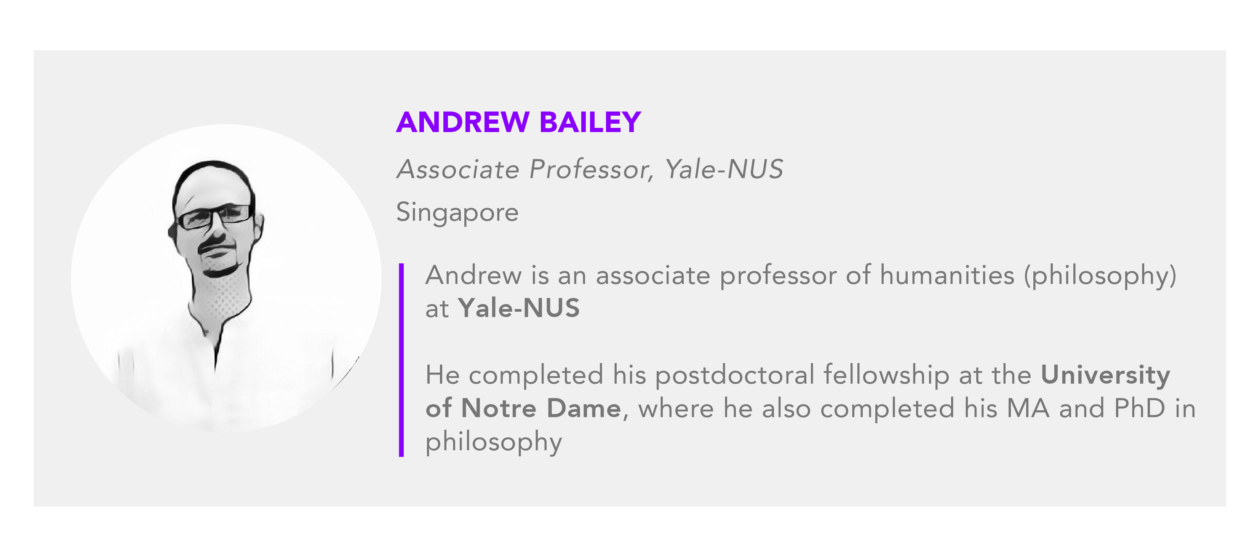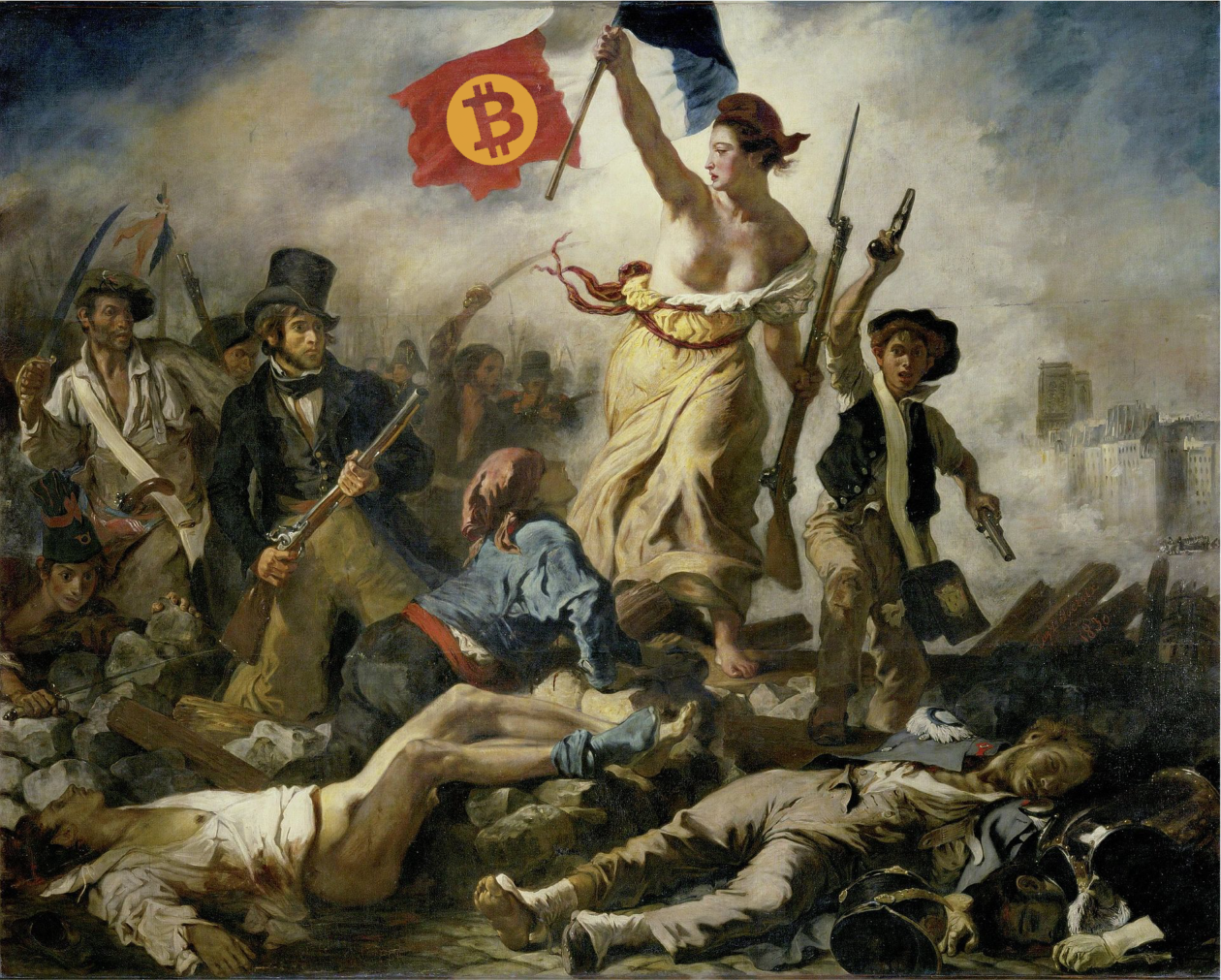To many people, money appears to function more as an instrument of control than a means of resisting control. It is typically the creation of a central authority that imposes the acceptance of its value on a population, and its uses and circulation are managed and controlled by state and financial institutions.

But can money — in the form of cryptocurrency like Bitcoin — be a force for resistance? In this Q&A, Andrew Bailey, an associate professor of humanities at Yale-NUS College in Singapore, tells Forkast.News that Bitcoin can.
Why do you say Bitcoin is a freedom technology?
First, it’s open. It’s built on open-source software. Anybody can read the code and see exactly what it does, so we don’t trust — we verify. You cannot open up the source code of Twitter or Facebook — these are proprietary intellectual properties held by those companies. You don’t actually know how their algorithms work. You have to trust.
Another way that Bitcoin is open is that the network that’s created by the Bitcoin software is permissionless. There is no one person, or entity, or small group of entities that can stop anybody from accessing Bitcoin.
Let’s say I want to send some Bitcoin to you. Here’s all that has to be in place for that to happen. You have to give me an address (there are thousands of different apps that allow you to generate your own Bitcoin address offline). You could then show me a little QR code. All I have to do to send you my Bitcoin is to post to the Bitcoin network a small transaction of 100-200 bytes, which I can do from anywhere in the world using any internet-connected device. And all of a sudden you’ve got some Bitcoin.
No government, no bank, no corporation — not Facebook, not [Twitter founder] Jack Dorsey, not Vladimir Putin, not Joe Biden — no one can stop us. That is a powerful technology for freedom.
Here’s another way in which Bitcoin is open — anybody can build on top of it. You can build apps that interact with Bitcoin in new ways. Nobody has to ask permission from “the Bitcoin company.”
Here’s the last piece of the puzzle, which is that money is very important — obvious but true. Money can make people do things they wouldn’t otherwise do. The ability to transfer value to signal that you value something by paying for it — that is such an important social function, and it’s been for the last 50 years under the tight control of large institutions. They control how we can signal value.
And once you see how open Bitcoin is, I think you start to see that this thing has to change the world. But it’s just getting started. There are billions more who have yet to access the network. They will. That’s my prediction.
When it concerns freedom, why are you interested in Bitcoin in particular?
Most of what I’ve said about Bitcoin, sadly, doesn’t hold true of other cryptocurrencies. Their networks are smaller, less censorship-resistant, less open, or more centralized
For example, Jameson Lopp, a well-known privacy advocate and developer, attempted to download and run [research & development foundation] Dfinity’s software to operate a full validating node on the new “Internet Computer” network. It didn’t work out — they only let pre-approved parties do this, on pre-approved hardware.
My own view is that it is essential for as many normal people as possible — not just those with access to fancy hardware and ultra-fast internet — to operate full, archival, validating nodes. Any network that doesn’t sustain this is destined to increasingly centralize.
So it seems that Bitcoin counteracts centralized authorities. Does this make Bitcoin anarchist, or does Bitcoin signal an anarchist future?
One of the things Bitcoin can do is discipline institutions. If I had to pick the ideal Bitcoin future, it would not be a future in which everybody has abandoned sovereign money and only uses Bitcoin. I don’t think that’s either realistic or desirable, but I think Bitcoin can provide an exit valve for the ones who desperately need it.
You can probably think of a million cases of people who would want to send or receive value where their local schools or churches or corporations or governments wouldn’t want them to. An exit valve is very powerful because it can discipline and incentivize existing institutions into doing better. I want a future where corporations are less powerful, and where their ability to stop someone from paying for a medical procedure (or buying a sex toy, or supporting politicians they like…) is limited, because we could always just use Bitcoin instead.
Can Bitcoin lead to equality by closing the wealth gap?
One of the things that separates rich from poor is not income, but access to financial assets. An asset is something that you own that preserves value over time, despite monetary expansion. The rich buy all sorts of fancy financial instruments, and in this [they] are protected from inflation. They don’t have to store their wealth in cash.
What this means is that inflation disproportionately harms those who are least well-off, because those are the people who hold cash on their balance sheets. They don’t have access to these fancy assets. Houses are not divisible, for example, and custody and verification are very expensive for gold.
Bitcoin is one tool among many that can be used to fight this monetary injustice. It is an asset that can be fractionalized. You can buy as small a fraction of it as you want. It is also very cheap to keep and to hold Bitcoin, even in extremely small amounts — unlike a house, where you pay property taxes. Bitcoin, unlike other assets, is also highly liquid — there’s always somebody who wants to buy it. And it’s easy to verify — all you need is a full node.
You can transmit Bitcoin across the globe at the speed of light, virtually for free in the Lightning Network, or for a fee on the blockchain. So what I see in Bitcoin is a democratization of a standard tool used to protect wealth that rich people have been using for thousands of years, namely, storing value in assets, not currencies. Bitcoin is the ultimate asset.
And it’s open. The technological barrier is low. As long as you have a phone, or a friend with a phone, or a family member who knows someone with a phone, you can get some Bitcoin and you can hold it, and you can store your wealth in its global network. I should note that Bitcoin does not historically protect wealth in the short term, because it’s too volatile. There are serious risks here. Over the long term, though, the history is pretty clear that Bitcoin has been a better way to store your wealth than U.S. dollars, stocks, bonds or real estate. Behind the speculative mania, we’ve watched an emergent store of value come into being that is accessible to anyone. This is a step forward for monetary justice.
If Bitcoin creates new freedom for everyone, does that include criminals? Is such freedom worth it, or will it do more harm than good?
I think we have to take a pragmatic approach here. We can’t compare the perfect world with no crime to a Bitcoin world. What we should instead do is compare the current world to a possible world that has more Bitcoin use. And what we see in the current world is that physical banknotes are widely used for drugs, terrorism financing, money laundering, buying weapons and so on. Criminals will always be with us. Our question shouldn’t be: “Is Bitcoin perfect?”. Our question should be: “Could Bitcoin make things worse, or better, or neither?”.
Now, the best data we have on Bitcoin suggests that fewer than 1% of Bitcoin transactions are for crime, according to reports by Chainalysis. In fact, a lot of criminals get caught because they use Bitcoin’s public blockchain, and so display their activity for all to see.
Now, criminals will get more sophisticated over time and use techniques that can obscure the amount, the origin and the destination of a transaction by blending their transaction with other transactions. But I don’t think there’s any good research to suggest that Bitcoin will be worse than banknotes.
What’s your next research topic on Bitcoin?
I think that the environmental impact of Bitcoin is the big problem for it to solve. This is the major objection to Bitcoin that I take seriously, and it has literally kept me up at night. We have a moral imperative to bring some resolution here if we’re to scale up Bitcoin even bigger than it already is.
I’m working on a paper right now that roughly says Bitcoiners need to pay for green Bitcoin mining. My co-author and I have a fancy view about how to make this happen, and the kind of financial instrument that could make that work. And it could even be profitable. But it doesn’t exist yet, so we’re trying to find partners who will help create this product.




